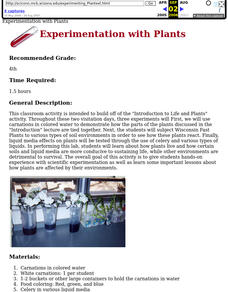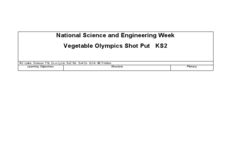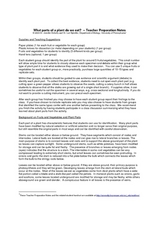Curated OER
Experimentation With Plants
Fourth graders experiment with different varieties of plants and draw conclusions after performing a series of lab activities. A very helpful student worksheet is given. This is a nicely done introductory lesson plan for life science.
Curated OER
Growing Pains
Students compare common food items with the parts of a plant. They grow their own plants to assess the difficulties in assisting a plant's growth and reproduction.
Curated OER
The Cell
Students visualize plant and animal cells, explain the parts of a cell and their functions and distinguish plant cells from animal cells. Working Students, in groups, must present a particular portion of a cell to the entire class.
Curated OER
Water Plants
Students examine the plants and animals that make their home in wetlands. While observing, they make sketches of the ones they see with a pencil. To end the lesson, they use watercolors to paint their flowers and animals at the local...
Curated OER
Above & Below the Pond
Students search for information and pictures about life in and around a pond. They visit a local ponds to sketch life that they see in the water and nearby. Students identify all plant and animal life. They find out what happens to pond...
Curated OER
Plants
Really only five slides of information, this resource is an outline on planting field crops. From it, aspiring agriculturists are exposed to different seeding methods: drilling, row crop planting, broadcast seeding, and air seeding. This...
Curated OER
Mountains
Explore the mountain habitat with this collection of slides. The climate is described, along with the associated plant and animal life. Some of the pictures are attractive, but some leave much to be desired. There is a generous amount of...
Curated OER
Green Plants
Beginning botanists are introduced to the world of plants with this PowerPoint. Some of the information is most appropriate for primary learners, such as the needs of a plant. Some of the information, however, is more directed at...
Curated OER
The Five Kingdoms
An overview of the five kingdoms within the biological classification system is presented in this set of five slides. The first lists the objectives of the slide show, and the second gives general characteristics of plant, animal, and...
Curated OER
Plant Parts
Second graders conduct research on plant parts. They listen to the book "Jack and the Beanstalk," explore various websites and read about plant parts, and create a movie using Kid Pix computer software.
Curated OER
The Dirt on Plants
Students draw and label the four parts of a plant. They describe changes that are part of the common life cycle. Students follow various one and two step directions. They are asked to discuss that they can recall about plants.
Curated OER
Science Unit Lesson Five
Sixth graders review how and which plants operate in terrariums. In groups, they follow instructions to make their own terrarium and place different types of plants in it. To end the lesson, they review the steps in the water cycle and...
Curated OER
Plants
Sixth graders examine how plants collect water and breathe. In groups, they participate in a variety of activities in which they discover how plants operate in terrariums. To end the lesson, they discuss why plants are important to the...
Curated OER
Children's Literature Across the Curriculum Ideas: The Magic School Bus Plants Seeds
Learners read The Magic School Bus Plants Seeds by Janna Cole. They complete a variety of cross-curricular activities surrounding the study of plants and seeds. Included are reading, art, math, science, writing, social studies, and...
Curated OER
Fayettewood Squares
If used as a center activity, this short presentation could be a motivating way for learners to review material relating to plants, the circulatory system, and more. However, there are only nine questions. It would be more useful if...
Curated OER
Tops and Bottoms
While the graphics are enticing, this presentation could be enhanced for use as part of a lesson on plants. The resource groups common foods into those that could be considered the tops or the bottom. For example, a mushroom is a part of...
Curated OER
Vegetable Olympics Shot Put
Learners explore the distribution of plant seeds. In this science instructional activity, students discuss plants that explode in order to spread their seeds. Learners create pea shooters and use dried peas to see how far they will travel.
Curated OER
The Seed Match
Young scholars study seeds and plants. In this science lesson, students explore seeds from various types of plants and complete a worksheet about seeds. Young scholars discuss plants that are fruits and vegetables and where they grow.
Curated OER
Importance of Fresh Vegetables and Fruits in Our Diets
Students explore the importance of fruits and vegetables in our diets. In this science lesson, students discuss various types of fruits and vegetables. Students play the good health=good diet game. Students discuss types of fruits and...
Curated OER
Photosynthesis Summary
In this photosynthesis summary, 6th graders read the one page passage which contains vocabulary, definitions and a summary of the process, then answer 2 guided reading questions.
Curated OER
Genetic Crosses With Two Traits
Students read a passage, consider a genetic square of plants and answer 3 short answer questions about it the concepts. For this genetics worksheet, students compose their answers on a separate piece of paper.
Curated OER
Which Parts of a Plant Do We Eat?
Young scholars identify the different parts of a plant. In this biology lesson, students examine its internal parts by dissecting it. They report their findings in class.
Curated OER
Plant Poetry
In this poetry worksheet, students complete a poem about plants and insert the right wording to each line. Students complete 10 lines of the poem with specific directions.
Curated OER
Sowing Seeds of the Future
Students explore how to preserve native wild plants and garden crops. In this science lesson, students play the role of botanists and research North American plants. Students create a presentation about their findings.

























